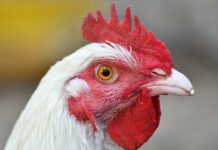“Whip-poor-will! Whip-poor-will! Whip-poor-will!” The song wakes me at first light. It’s why I keep the bedroom windows open.
The song of the whip-poor-will is my favorite alarm. I suppose I value it because I hear it so rarely. Over the last 25 years, I’ve heard it just a handful of times, and just for a few minutes at night or in the early morning.
That’s why I was so excited when my wife, Linda, told me she had heard a whip one evening about a week ago. I was traveling and hoped it would hang around. It did. For almost a week we have heard it, sometimes in the evening, sometimes in the early morning. Might a pair actually be nesting in the woods?
Recognizing it
The song of the whip-poor-will is like a turkey gobble. It’s recognizable the first time it’s heard. Whip-poor-wills sing their own name — “whip-poor-WILL!” with the accent on the last syllable. Males sometimes sing for hours, so they can be difficult to miss.
Whip-poor-wills are a bit smaller than robins, nocturnal and of no commercial value, so they have been poorly studied. Population estimates are based primarily on breeding bird counts.
Some biologists fear that whip-poor-will numbers are declining. I suspect that whip-poor-wills suffer from poisoning by pesticides. They eat flying insects (especially large moths) almost exclusively and winter in Latin America, where pesticides are less rigidly controlled than in the U.S.
Elusive
A description of whip-poor-wills is unnecessary because they are rarely seen. They spend their days nestled on the forest floor where their cryptically colored bodies blend in perfectly with the leaf litter.
At dusk, whips come to life and make their living snatching night flying insects from the air. A huge gaping mouth, surrounded by a ring of specialized feathers called rictal bristles, serves as an efficient aerial net for capturing insects on the wing.
After a male attracts and courts a female, she lays two mottled eggs directly on the leaf litter. The female alone incubates the eggs for about 20 days, and 20 days later the young whip-poor-wills can fly and begin learning to fend for themselves.
Memories
If you were born before 1960 and grew up in the mountains or near big woods, you can probably recall the persistent, repetitive song of the whip-poor-will. Memories of this name-sayer singing for hours on end between dusk and dawn are fond and indelible. If the bird perched outside your bedroom window, the memories may not be so fond.
In 25 years here on the ridge, I’ve heard a whip-poor-will only five times. The first time, in 1992, remains my favorite. Emma, who was not quite three at the time, and I sat on the deck enjoying a colorful spring evening sky. Wood thrush vespers echoed in the woods.
Then, in the distance, I heard three faint, familiar notes. “Whip-poor-will!” And again, “Whip-poor-will!” For a full minute the bird sang, and I smiled. The song was too distant for Emma to hear.
Daring visitor
After a few minutes of silence, the bird called again. It had moved closer to the house. Emma heard it and sensed my excitement. She listened carefully. Then again the bird fell silent. Suddenly, the bird called again. He had come even closer. Having often heard me doing bird calls, Emma began mimicking, “Whip-poor-will, whip-poor-will!” Then a scene unfolded that’s forever etched in my mind.
As I gazed in the direction of the song, a dark form fluttered like a giant moth directly toward the deck. It cruised in just a few feet above the ground, heading straight for the house. As it reached the edge of the deck, it pulled up, snatched a moth from the air, turned, and flew back toward the woods.
When it turned, large white patches on its fanned tail confirmed the bird was a male. Several minutes later he called again.
By now it was completely dark, and Linda and Nora had joined us on the deck. We listened 20 minutes longer, so Emma and Nora could tune their ears to this special sound of the night woods.
That night we all fell asleep to the song of the whip-poor-will.
(Send questions and comments to Dr. Scott Shalaway, RD 5, Cameron, WV 26033 or via e-mail at his website, http://scottshalaway.googlepages.com.)












